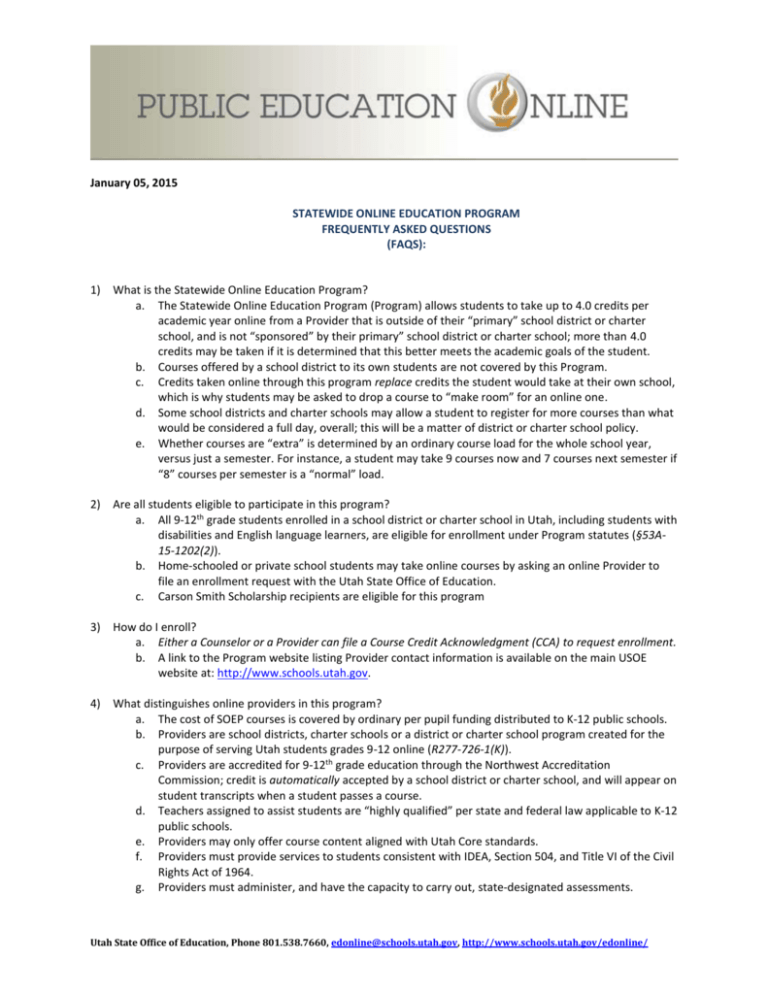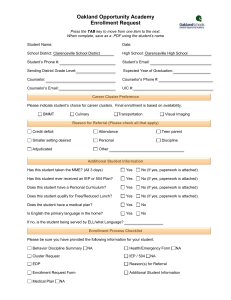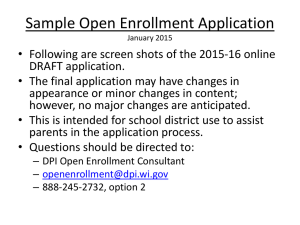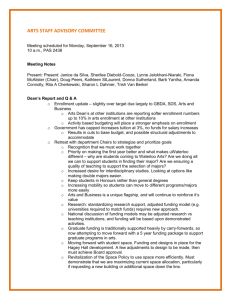Statewide Online Education Program FAQs
advertisement

January 05, 2015 STATEWIDE ONLINE EDUCATION PROGRAM FREQUENTLY ASKED QUESTIONS (FAQS): 1) What is the Statewide Online Education Program? a. The Statewide Online Education Program (Program) allows students to take up to 4.0 credits per academic year online from a Provider that is outside of their “primary” school district or charter school, and is not “sponsored” by their primary” school district or charter school; more than 4.0 credits may be taken if it is determined that this better meets the academic goals of the student. b. Courses offered by a school district to its own students are not covered by this Program. c. Credits taken online through this program replace credits the student would take at their own school, which is why students may be asked to drop a course to “make room” for an online one. d. Some school districts and charter schools may allow a student to register for more courses than what would be considered a full day, overall; this will be a matter of district or charter school policy. e. Whether courses are “extra” is determined by an ordinary course load for the whole school year, versus just a semester. For instance, a student may take 9 courses now and 7 courses next semester if “8” courses per semester is a “normal” load. 2) Are all students eligible to participate in this program? a. All 9-12th grade students enrolled in a school district or charter school in Utah, including students with disabilities and English language learners, are eligible for enrollment under Program statutes (§53A15-1202(2)). b. Home-schooled or private school students may take online courses by asking an online Provider to file an enrollment request with the Utah State Office of Education. c. Carson Smith Scholarship recipients are eligible for this program 3) How do I enroll? a. Either a Counselor or a Provider can file a Course Credit Acknowledgment (CCA) to request enrollment. b. A link to the Program website listing Provider contact information is available on the main USOE website at: http://www.schools.utah.gov. 4) What distinguishes online providers in this program? a. The cost of SOEP courses is covered by ordinary per pupil funding distributed to K-12 public schools. b. Providers are school districts, charter schools or a district or charter school program created for the purpose of serving Utah students grades 9-12 online (R277-726-1(K)). c. Providers are accredited for 9-12th grade education through the Northwest Accreditation Commission; credit is automatically accepted by a school district or charter school, and will appear on student transcripts when a student passes a course. d. Teachers assigned to assist students are “highly qualified” per state and federal law applicable to K-12 public schools. e. Providers may only offer course content aligned with Utah Core standards. f. Providers must provide services to students consistent with IDEA, Section 504, and Title VI of the Civil Rights Act of 1964. g. Providers must administer, and have the capacity to carry out, state-designated assessments. Utah State Office of Education, Phone 801.538.7660, edonline@schools.utah.gov, http://www.schools.utah.gov/edonline/ 5) Can my school district or charter school choose not participate in the Statewide Online Education Program? a. No. State law requires that the Statewide Online Education Program is an option for ALL 9-12th grade students, even in school districts and charter schools with existing online programs. b. School counselors and other staff may not discourage enrollment with or give preference to one online option or public Provider over another (§53A-15-1204(5)), including online options offered by the Primary school district to its own students. 6) Who is the “primary LEA of enrollment,” and who is the “primary school of enrollment?” a. The primary LEA of enrollment means a student’s school district or charter school in charge of locally administering education(LEA) (§53A-15-1202(9), R277-726-1(L)). Utah law defines a "Primary LEA of enrollment" as the LEA in which an eligible student is enrolled for courses other than online courses offered through the Statewide Online Education Program. b. The primary school of enrollment means a student’s school or charter school of record, where the student takes the majority of his/her classes. This school maintains the student’s cumulative file, enrollment information and transcript (R277-726-1(M)). 7) How can I evaluate a Provider? a. Providers must administer state-designated assessments, and will post results on their websites (R277-473; R277-726-7(A)). b. The Utah State Board of Education posts a report on the performance of Providers which may be used to evaluate the quality of a Provider (§53A-15-1211) at: www.SCHOOLS.UTAH.GOV/EDONLINE c. Call and talk to Providers. Their staff can tell you about unique features of their programs. Contact information is available on the website listed here (above). 8) Who will administer an A.P. test? a. Neither a Provider LEA nor a Primary LEA is required to facilitate A.P. testing. b. This should be discussed with both LEAs. 9) Can a student “make up” credits or take “extra” credits through this program? a. Maybe. b. If your school district or charter school allows this, you may register for courses that you take in addition a full course load at your primary school. Your school district or charter school may charge a fee for these courses. c. If a school district or charter school does not allow a student to make up credits through this program, a student may still access options that the school or district provides to its own students, including Electronic High School, are free. 10) My child wants to take an online course offered through his boundary school, which is a member of an online consortium with other school districts to offer their students online courses. Does this require us to file a CCA? a. No. 11) Can a student take additional credits now, to allow a student to graduate early later on? a. Yes. b. An SEOP must provide for early graduation. 12) Under what circumstances can a child exceed the 4.0 credit limit in place for the 2013-14 school year? a. A student may take more than three online credits in a year if: (a) the school district or charter school, OR (b) the State Board of Education (USOE), finds this to be better meet the academic goals of the student. b. This may be requested on the CCA form; parents may file an appeal with USOE if this request is rejected by the primary school district or charter school. 2 13) My daughter is active in sports, and needs to maintain a certain GPA to participate. Will her online courses count toward her athletic eligibility? Can the coach check her grades and attendance? a. These topics should be discussed with a School Counselor. A school of record will standards for student grades and enrollment in online courses for purposes of: (1) school awards and honors, and (2) Utah High School Activities Association participation, and (3) graduation requirements. b. Your daughter must notify her Coach that she is taking online courses, and she should notify the online Provider that the Coach will be checking her grades and progress periodically throughout the semester. c. NOTE: An online course may or may not count towards NCAA eligibility. Each Provider must submit its courses to NCAA separately for eligibility “approval,” as eligibility partially depends on the method of instruction and supervision used and other factors. 14) Will my child be allowed to remain on the school campus for periods in which he is registered for an online course? a. Maybe. b. Neither the primary school nor the provider school is required to offer physical space and/or supervision during periods of online enrollment. 15) If my daughter has Release Time for one period, does this allow her to enroll in an online course for this period? a. Yes. b. There is no need to drop any release time to accommodate online enrollment. 16) Online courses are offered by my son’s boundary school, this Program, and the Utah Electronic High School. How do we access these options? a. For any course offered directly by your district, a school counselor may register the student through the ordinary school registration process. b. For a course offered from outside of your district, through a Provider in this Program, either a school counselor or a Provider can file a Course Credit Acknowledgment form requesting enrollment. This may be done at any time during the calendar year, but will optimally take place during ordinary spring registration processes. c. For Electronic High School, the student can register online, or through a school counselor. 17) Can a student take half of a full-year course online, and the other half in a traditional classroom? a. Yes. 18) What if a student registers in the spring, and changes their mind once they begin coursework, in the fall. Can a student withdraw? a. Yes. b. A student may withdraw up to 20 days after course begins, or after a semester break. c. Students and parents are responsible for notifying Providers immediately of any change in plans affecting enrollment. 19) My child wants to continue school work during summer months. Is this possible? a. Not usually. b. Providers function on traditional school-calendar basis, and do not normally expect their staff to work in summer months. If the period given to a student to complete an online course includes summer months, the parent should discuss arrangements for this period with the Provider. 20) My child is enrolled at our local high school in traditional courses for three courses, and home schooled otherwise. I would like to enroll my student in online courses. How can this be done? 3 a. b. When a student is released for home schooling but also chooses to participate in public school to some limited extent, this is called “dual enrollment.” Either the local high school counselor OR a Provider can fill out CCAs to request that your child is enrolled for the online courses. 21) In requesting enrollment in an online course, I noticed that the form asks if my child has a “Fee Waiver.” Why is this included? a. Providers may charge fees consistent with those of other secondary schools (R277-736-7(E)). A student whose family qualifies for a fee waiver may not have to pay fees or purchase materials that would ordinarily be free to the student at the student’s primary school district of enrollment. 22) Who is accountable for students eligible for services under the IDEA and Utah State Board of Education Special Education Rules (USBE SER)? a. The Utah State Board of Education (USBE) has determined that only one LEA retains accountability for a student’s receipt of a Free Appropriate Public Education (FAPE). Based on that determination, for purposes of this Statewide Online Education Program, accountability for FAPE and compliance with the Individuals with Disabilities Education Act (IDEA) and USBE Special Education Rules (USBE SER), including monitoring and dispute resolution, lies with the primary LEA of enrollment. Primary LEAs of enrollment will need to develop policies and procedures for implementing the Program. Those policies and procedures should include provisions for students with disabilities (R277-726-3, 5). For students with an IEP, participation in the Statewide Online Education Program may require a revision of the student’s IEP; this would be initiated by the counselor at the primary school of enrollment or based on the LEA’s specific policies and procedures for implementing this program. b. School districts are encouraged to develop policies that will ensure proper review of IEP or 504 Accommodation Plans prior to decisions to enroll students in online courses, and to provide notice to providers of necessary accommodations subsequent to provider acceptance of a Course Credit Acknowledgement but prior to a student beginning participation in a course. c. Online course providers (Providers) are expected to comply with IDEA and Section 504 requirements (R277-726-7(C)). Providers in the Statewide Online Education Program must provide the special education services and accommodations that the student requires, as per the IEP or 504 plan (Id). If a Board investigation finds that a Provider has violated IDEA or Section 504 provisions for students taking online courses, the Provider shall compensate the student’s Primary LEA of enrollment for all costs related to compliance (R277-726-6(G,H,I,J)). 23) Does attendance in the Statewide Online Education Program usurp the IEP process? a. No. Students with disabilities who are otherwise eligible for the Program are welcome to enroll in the Statewide Online Education Program by completing the Course Credit Acknowledgement. b. When a student enrolls in a new school, that school must make a request for records to the school or district where the student was previously enrolled; for an online Provider, this is the school or district where the student (in contrast to the former situation) remains enrolled, and which is the school of record. These records will include information concerning an IEP or other accommodation instructions. c. Providers are responsible for requesting information from a primary school of Enrollment for students enrolling in their program (R277-726-7(6)). d. Primary school districts and charter schools will be responsible for developing policies to ensure proper review of IEP or 504 accommodation plans prior to decisions to enroll students in online courses; it would be wise to include a representative from the provider in the IEP or 504 plan review. 24) How will UPIPS address monitoring for students enrolled in the Statewide Online Education Program? a. Students enrolled in the Program have been included in the special files list for UPIPS monitoring. 25) My son has a Section 504 Accommodation Plan. Is he allowed to participate in an online course? 4 a. b. c. For enrollment in this program by any student, a Course Credit Acknowledgement (CCA) form has been developed by the USOE and is available on the USOE website. This includes clarification about whether a student has an IEP or 504 plan. The primary school of enrollment will designate a counselor to review the CCA form to ensure consistency with graduation requirements, the student’s SEOP, and the student’s IEP or Section 504 plan, if applicable (R277-726-3(B)). If approved, the counselor gives preliminary approval to the CCA and submits the CCA (R77-726-3, 5). Each LEA should develop policies and procedures for the administration of this program. As the gatekeeper of the CCA process, the counselor should establish whether the student has an IEP or Section 504 plan and include relevant school staff, such as the IEP team or student’s teacher(s), in the preliminary approval process. If a student with an IEP wants to enroll in the program, it is recommended that the student’s IEP team meet to consider and plan for the requested changes in order to ensure that the student will continue to receive the special education and related services required for a free appropriate public education (FAPE). A primary school of enrollment must transmit IEP or 504 Accommodation plans to the online provider within 72 business hours of receiving notice that the provider has accepted an online enrollment. 26) The student’s IEP team and CCA counselor may consider the following questions helpful in determining the student’s need for services and /or accommodations in the online subject matter or in accessing the online course content. a. How might the student’s current IEP need to be modified or amended to ensure FAPE in light of attendance in the Program? Consider the following: i. What is the expected impact on academics and social emotional development of the student? Consider both intended and unintended consequences. ii. Has the student had specific instruction in using a variety of programs on the computer? iii. Has the team considered the technological skills required for this class? iv. Has the team considered what specialized instruction the student may require for this class? v. Has the team considered the need for supplementary aids and services for this class? 27) What about student confidentiality? a. Providers are responsible for confidentiality provisions in State and Federal law. All Providers in the Program are familiar with confidentiality requirements applicable to public education. 28) What do I do if my child wants to drop a course? a. Contact the provider. If the student is still within the 20 days allowed for Withdrawal, there is no problem dropping the course. If it is later, USOE will contact your school counselor and the provider to determine what action should be taken. b. You may also contact the USOE Statewide Online Education Program Specialist at (801) 538-7660 or cory.kanth@schools.utah.gov. 5





